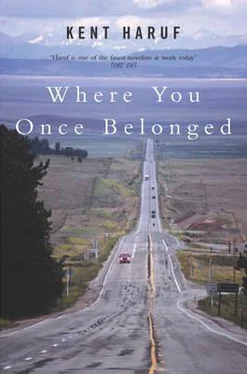Kent Haruf - Where You Once Belonged
Здесь есть возможность читать онлайн «Kent Haruf - Where You Once Belonged» весь текст электронной книги совершенно бесплатно (целиком полную версию без сокращений). В некоторых случаях можно слушать аудио, скачать через торрент в формате fb2 и присутствует краткое содержание. Год выпуска: 2004, Издательство: Pan MacMillan, Жанр: Современная проза, на английском языке. Описание произведения, (предисловие) а так же отзывы посетителей доступны на портале библиотеки ЛибКат.
- Название:Where You Once Belonged
- Автор:
- Издательство:Pan MacMillan
- Жанр:
- Год:2004
- ISBN:нет данных
- Рейтинг книги:5 / 5. Голосов: 1
-
Избранное:Добавить в избранное
- Отзывы:
-
Ваша оценка:
- 100
- 1
- 2
- 3
- 4
- 5
Where You Once Belonged: краткое содержание, описание и аннотация
Предлагаем к чтению аннотацию, описание, краткое содержание или предисловие (зависит от того, что написал сам автор книги «Where You Once Belonged»). Если вы не нашли необходимую информацию о книге — напишите в комментариях, мы постараемся отыскать её.
Where You Once Belonged — читать онлайн бесплатно полную книгу (весь текст) целиком
Ниже представлен текст книги, разбитый по страницам. Система сохранения места последней прочитанной страницы, позволяет с удобством читать онлайн бесплатно книгу «Where You Once Belonged», без необходимости каждый раз заново искать на чём Вы остановились. Поставьте закладку, и сможете в любой момент перейти на страницу, на которой закончили чтение.
Интервал:
Закладка:
“And I seen it all,” Foley told us. “I seen everything.”
Then he was finished. There were others walking along the tracks toward us to look at the car: Ed Taylor and Mrs. Taylor, who had come into town to attend church; they were dressed up. Foley walked over to them and began to tell them his story.
My dad watched him for a moment. “That’s the trouble with eyewitnesses,” he said. “They just think they’ve seen it all. And every time they tell it they think they have to improve on what they’ve already told somebody else.”
“Didn’t you believe any of it?” I said.
“Maybe. But George Foley likes to hear himself talk. It’s how he makes his living.”
“I thought he was a barber.”
“He is.”
“Oh,” I said.
“So now I’m going over to the depot,” my dad said, “to see if I can find the engineers. I want to hear what they have to say. Then I’ll check with the police. In the meantime you can take some more pictures.”
He walked away toward the depot. I didn’t know what more he had in mind for me to take pictures of. But I moved around to the far side of the car and took several photographs from that angle, with the car in the foreground and the train risen up black and massive behind it. There was still snow on the ground where people had tracked it and the contrast of the snow and the train should have made a good picture, but I forgot about facing into the sun so that later when the photographs were developed it all looked washed out. There was a lot that I didn’t know yet.
When I had finished I decided I wanted to look inside the car. I hadn’t done that yet and thought I wanted to. Afterward I was sorry I had. There was blood on the crushed dashboard and there were ragged bits of the old man’s coat stuck to the driver’s door. And hanging from one of the rags was a flap of skin which still had hair growing from it. I felt sick. I walked away from the car back along the tracks toward Main Street.
I intended to wait for my dad in our car, where we had parked it at the curb in front of Kinsey’s Hardware. But before I got there I met Jack Burdette.
Jack was alone. He was walking toward me along the tracks in his winter coat; his face looked pasty and he hadn’t shaved yet. I stopped when we were close to one another.
“Did you see it?” he said.
“Yes. But I’m sorry about your father.”
“Everybody is,” he said.
Then I didn’t know what to say. I thought of warning him. But I didn’t.
He went on and I turned to watch him walk along the tracks. Beside the train he looked cold and dark and solitary. Then he reached the car and I could see that George Foley had discovered him. Foley was already beginning to talk. He put his arm around Jack, while the other people stepped back a little, but I didn’t want to watch it. I knew what Foley had to tell him. I went on and got into our car and turned the heater on and waited for my dad to come back from the depot.
3
They buried Jack’s father on the following Tuesday in the Holt County Cemetery northeast of town. In the nights preceding the funeral there was a wake, then on the day of the funeral there was a Mass of the Dead in the morning at St. John’s Church. Afterward, outside, it was very cold standing at the gravesite. Old Father O’Brien said quickly what he had to over the closed casket and spoke in Latin while he scattered ashes. When it was over those of us who attended the gravesite rites filed past Jack and his mother and took off our gloves to shake their hands. Then we went home, or back to school or back to work, and they were left alone.
Things were tight then. Don Nexey, who owned the lumberyard, gave Mrs. Burdette a check equal to two months of her husband’s salary — which was generous of him, people said; he wasn’t required to do that — but the extra money would not have gone far, probably not much beyond the cost of the funeral and the old man’s casket. As a result, in the middle of January Mrs. Burdette, who had never worked outside the home before, took a job at Duckwall’s Store on Main Street. They hired her as a clerk. And every day now if you looked through the big display windows you could see her inside the store, wearing a thin green smock over her plain dresses and standing at the cash register or working farther back, dusting and tidying the racks of picture frames and cheap toys. In this way they still had a small regular income each month and I suppose by being very frugal were able to make ends meet. Still I don’t think money was the only consideration. At school we began to notice that Jack had changed. He was brooding and surly now. Things had gotten difficult for him.
It had to do with his mother. I think Mrs. Burdette believed that she had been given a new chance. It was as if she thought with the old man’s death that she had been given a fresh opportunity. To save Jack, I mean; to prevent his becoming what she had only been able to tolerate in his father — tolerate simply because, given her beliefs and the tenor of the times, the thought of divorce was completely and utterly in tolerable. So she tried to assert herself. I suppose she even harbored the notion that Jack might yet turn out to be one of God’s children and suffered to come unto Jesus. I don’t know. I can’t say what went on in her head or how she thought. But I know that Jack was pretty miserable for a time. And I don’t think it had a lot to do with grieving over his father’s death.
This went on for about two months, until about the end of February. Then he broke with her. He did something which alienated his mother forever and which at least temporarily astonished the rest of us. And looking at it now in retrospect, it seems to have established a pattern for him — or to have confirmed one anyway — a pattern which involved both a sudden move and a rash concomitant act. He left his mother and moved into the Letitia Hotel.
It was an old ramshackle two-story frame building with a deep long porch on its north side. It was built in 1914 by an early resident, an Irishman who had arrived some twenty years earlier as a small boy in the company of his parents. Then the mother died of influenza while he, the immigrant boy, watched, and so years later when he built the hotel he gave it her name out of lingering grief and old affection. It stood (and still stands, though a rooming house now for old men and migrant laborers and drunks) on the corner of Second and Ash streets, a block west of Main. Across the street there is an old hackberry tree which isn’t doing very well. The local historical society claims that it was one of the first trees planted in Holt County and they’ve erected a cement curb around it to protect it.
Jack’s room was on the second floor. There wasn’t much in it: an old iron bed and wooden dresser and a gauzy-curtained window overlooking Second Street. It didn’t have any sink or bathroom; the only bathroom on the second floor was at the end of the hall, a space about the size of a walk-in closet. But it didn’t cost much to room at the hotel and he took his meals (when he wasn’t eating at Wanda Jo Evans’s house or with one of the rest of us) in the little dining room on the first floor.
He paid for these — the rent and the occasional dinners — by working at the Farmers’ Co-op Elevator beside the railroad tracks. He had first begun to work at the elevator in the summer when he was sixteen. They had put him to work scooping wheat and unloading grain trucks and running the big augers. Now he began to work there in the afternoons after school and on the weekends as well. The work suited him exactly. It gave him another opportunity to sweat, to display that considerable strength of his, to expand himself amongst the exhaust of trucks and the clouds of grain dust. They were even paying him something for his efforts. Then, too, there was always that rough backslapping of the men who worked there, their sardonic talk and their jokes. For the men liked him, of course: Jack was a local phenomenon. They talked football to him. They remembered each game he had played better than he did himself, and not just the scores but the individual plays and the records he had set as well. They kidded him, they slapped his back; it was a kind of grown-man’s adulation, a form of praise he needed and enjoyed.
Читать дальшеИнтервал:
Закладка:
Похожие книги на «Where You Once Belonged»
Представляем Вашему вниманию похожие книги на «Where You Once Belonged» списком для выбора. Мы отобрали схожую по названию и смыслу литературу в надежде предоставить читателям больше вариантов отыскать новые, интересные, ещё непрочитанные произведения.
Обсуждение, отзывы о книге «Where You Once Belonged» и просто собственные мнения читателей. Оставьте ваши комментарии, напишите, что Вы думаете о произведении, его смысле или главных героях. Укажите что конкретно понравилось, а что нет, и почему Вы так считаете.












